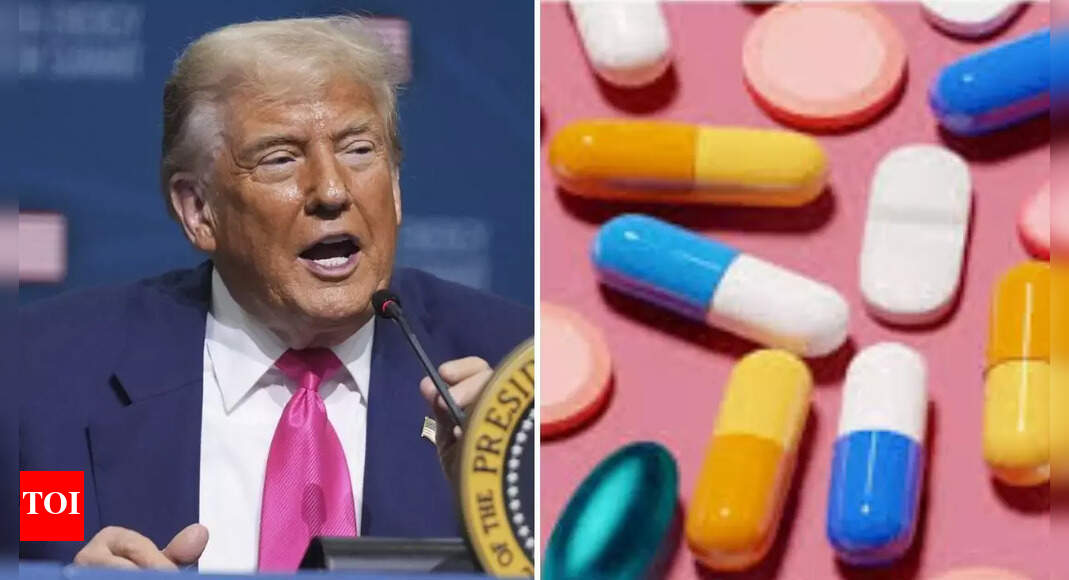Health
Trump Imposes 100% Tariffs on Branded Drugs Starting 2025

U.S. President Donald Trump has announced a significant policy shift by imposing a 100% tariff on imported branded and patented pharmaceuticals, effective from October 2025. This decision aims to stimulate domestic manufacturing and reduce reliance on foreign medications. While Indian generic drug manufacturers will initially remain unaffected, the broader implications for the pharmaceutical sector raise concerns, particularly regarding potential future expansions of these tariffs.
The tariff implementation is part of a broader strategy by the Trump administration to bolster the U.S. economy by encouraging local production. The administration argues that this move will not only support American jobs but also lead to lower drug prices for consumers by fostering competition. However, the reaction from the pharmaceutical industry has been mixed, with apprehensions about how this could impact pricing and availability of medications in the United States.
As it stands, Indian generic drug makers, which play a crucial role in supplying affordable medications worldwide, will not be immediately impacted by the new tariffs. This is particularly significant given that many of these companies provide essential drugs to the U.S. market. Nevertheless, the looming possibility of tariffs being extended to complex generics could pose risks for these manufacturers in the long run.
One company that could face considerable challenges is Sun Pharma, one of India’s largest pharmaceutical firms. With a substantial portfolio of branded products in the U.S. market, the company is particularly vulnerable to the ramifications of these tariffs. Analysts suggest that Sun Pharma’s exposure to the U.S. market could lead to revenue fluctuations, depending on how the tariffs evolve and how the market reacts.
The pharmaceutical landscape is already complex, with various factors influencing drug pricing and availability. The introduction of such tariffs could further complicate the situation, potentially leading to higher costs for consumers if manufacturers decide to pass on additional expenses.
Industry experts are closely monitoring the developments, especially in light of the ongoing discussions surrounding healthcare reform and drug pricing in the United States. The full impact of these tariffs will depend not only on their implementation but also on how both domestic and international pharmaceutical companies adapt to the changing regulatory environment.
As the deadline approaches, stakeholders in the pharmaceutical sector will need to strategize effectively to navigate the potential risks associated with these new trade policies. The administration’s decision highlights the intricate balance between fostering domestic industry and ensuring access to affordable medications.
In summary, the impending 100% tariffs on imported branded drugs represent a pivotal moment for the U.S. pharmaceutical industry. While Indian generic companies currently remain insulated, the potential for future tariff expansions raises significant questions about the stability and accessibility of medications in the U.S. market. As the situation develops, it will be essential for all parties involved to stay informed and prepared for the outcomes of this policy change.
-

 World5 months ago
World5 months agoSBI Announces QIP Floor Price at ₹811.05 Per Share
-

 Lifestyle5 months ago
Lifestyle5 months agoCept Unveils ₹3.1 Crore Urban Mobility Plan for Sustainable Growth
-

 Science4 months ago
Science4 months agoNew Blood Group Discovered in South Indian Woman at Rotary Centre
-

 World5 months ago
World5 months agoTorrential Rains Cause Flash Flooding in New York and New Jersey
-

 Top Stories5 months ago
Top Stories5 months agoKonkani Cultural Organisation to Host Pearl Jubilee in Abu Dhabi
-

 Sports4 months ago
Sports4 months agoBroad Advocates for Bowling Change Ahead of Final Test Against India
-

 Science5 months ago
Science5 months agoNothing Headphone 1 Review: A Bold Contender in Audio Design
-

 Top Stories5 months ago
Top Stories5 months agoAir India Crash Investigation Highlights Boeing Fuel Switch Concerns
-

 Business5 months ago
Business5 months agoIndian Stock Market Rebounds: Sensex and Nifty Rise After Four-Day Decline
-

 Sports4 months ago
Sports4 months agoCristian Totti Retires at 19: Pressure of Fame Takes Toll
-

 Politics5 months ago
Politics5 months agoAbandoned Doberman Finds New Home After Journey to Prague
-

 Top Stories5 months ago
Top Stories5 months agoPatna Bank Manager Abhishek Varun Found Dead in Well









